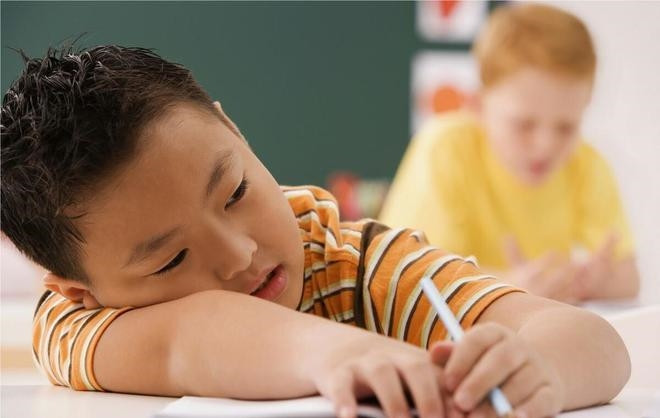This large-scale study found that parenting styles, home environment, educational background, income, and other factors can predict a child's future academic achievement.
In a published study, the University of Michigan (UM) - one of the leading public research universities in the US - analyzed data from more than 8,000 families in the United States from 1968 to 2008, revealing how parents influence their children's scores.
This large-scale study found that parenting styles, home environment, educational background, income, and other factors can predict children's future academic achievement, specifically literacy and math skills.

Findings suggest that giving children more cognitive stimulation at a young age is more likely to lead to better academic performance in the future (Illustration photo)
Accordingly, the influencing factors are:
1. Parents' reactions to their children's poor performance:When parents notice that their child’s performance is not up to expectations, their responses fall into two categories: Punishment and proactive behavior. Punishment involves treating the child harshly, disciplining the child, restricting the child’s recreational activities, etc. Proactivity includes contacting the teacher, talking to the child, paying more attention to the child’s activities, and helping the child with homework.
2. Family warmth:It is the emotional quality of family relationships, including the encouragement and support parents give their children. Studies have found that providing children with a warm and emotionally stable environment can make them more accepting of their parents' teachings.
3. Cognitive stimulation:For example, talk to your child regularly, buy books for your child, take your child to museums, and other ways to promote your child's cognitive development.
4. Parents' demographic factors:Parents' education, income, race.
Subsequent analysis yielded the following results:
Findings suggest that children who are more cognitively stimulated as children do better academically later in life. While punishing children is likely to reduce academic achievement.
Family warmth, such as support, encouragement, and praise, did not play a clear role in predicting children's academic performance. In adolescence, neither cognitive stimulation nor punishment predicted children's academic performance.
The higher the level of parental education, the more likely it is that parents will provide more cognitive stimulation to their children. Children are more likely to do well academically. However, income does not predict academic achievement.
This result is combined with the analysis and discussion of the researchers to conclude:
1. If you want your child to have good academic performance in the future, talk to him often when he is young, buy him books, and participate in many activities that are beneficial for cognitive development.
2. When your child's performance is not as expected, punish them less, but understand why they are not studying well and help them make changes with a goal. Punishment will make children have negative feelings about studying and may not solve the real cause.
3. Provide regular encouragement, support, and praise. Although it does not have a strong predictive effect on academic achievement, providing a warm home is beneficial to children's physical and mental health.
4. From puberty onwards, whether you punish your child when he/she does not study well or give him/her many opportunities to stimulate his/her cognition, it will not affect his/her academic performance too much. However, if punishment is applied too much, it can still reduce the child's interest in learning and autonomy.
5. Whether a family has money or not does not directly affect academic performance, but how much money and effort parents spend on their children's cognitive development is very important to their children's academic performance.
6. However, other studies have also shown that the number one factor influencing academic achievement is a child's interest in learning!
The biggest role of this research is to tell worried parents that: Apart from other uncontrollable factors such as genes and environment, what parents can do that has a big impact on their children's academic performance is to provide cognitive stimulation, punish them less, pay attention to nurturing their children's interest in learning, and provide them with a warm home.
By Family